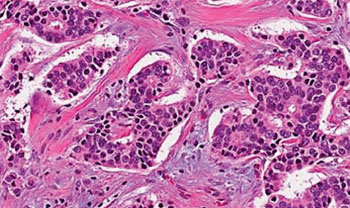Multiple Biopsies Recommended for Personalized Breast Cancer Treatments
By LabMedica International staff writers
Posted on 01 Dec 2016
Assessment of somatic mutations is becoming increasingly important for the management of cancer patients, but molecular heterogeneity occurs across many tumors. In breast cancer, there is major interest in the use of pre-surgical studies for assessing the biological effect of therapeutic agents.Posted on 01 Dec 2016
Genetic profiling of patients' tumors using biopsies has become more common in recent years, helping to drive personalized therapy and ensure that patients receive the treatments most likely to be effective for them and by analyzing a further biopsy could catch key genetic mutations that may influence a patient's response to aromatase inhibitor treatment.

Image: These estrogen receptor-positive (ER+) breast cancer cells preserved epigenomic determinants that may be prognostic for cancer survival (Photo courtesy of the National Cancer Institute).
A large team of scientists led by those at the Institute of Cancer (London, UK) analyzed samples from the POETIC trial (perioperative endocrine therapy - individualizing care), the largest pre-surgical study to date to identify what makes some patients respond well to aromatase inhibitors while others do not. In POETIC, post-menopausal women with estrogen receptor-positive (ER+) breast cancer received an aromatase inhibitor for a four-week period starting two weeks prior to standard surgery. Biopsies were collected at baseline and surgery, and a control group of patients were not given aromatase inhibitor treatment but still had two samples taken, which allowed genetic differences in repeat biopsies to be seen without any potential confounding effects of treatment.
The investigators found that comparing the six most frequently mutated genes in paired baseline and surgery samples from 86 patients, the same mutations were present in both samples in 71% of cases, but at least one of the mutations was present in only one of the samples in 29% of patients. The control and treated groups were analyzed separately, as well as together, revealing no difference in the variability of mutations between samples, and indicating that the short-term use of aromatase inhibitors had not influenced the comparisons. The team also identified that mutations to a particular gene could be centrally involved in the resistance to aromatase inhibitor treatments used in ER+ breast cancer, such as anastrozole and letrozole.
Mitch Dowsett, PhD, FMedSci, a Professor of Biochemical Endocrinology and study leader said, “Accurately identifying the mutations in cancers are critical to our understanding of the causes of cancer and to the development and targeting of new drugs more precisely to individual patients. Our work in patients with the most common form of breast cancer showed that to identify the mutations accurately in an individual's tumor required more than one biopsy of the type usually used for diagnosis. It is critical that we take this information into account as we try to identify those patients most likely to respond to our new therapies.” The study was published on November 9, 2016, in the journal Nature Communications.
Related Links:
Institute of Cancer













